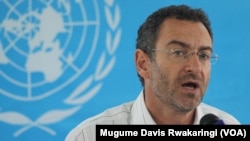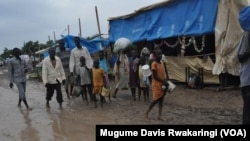JUBA —
A week after yet another peace deal was signed for South Sudan, the threat of famine still stalks the world's youngest nation, where more than seven million people are at risk of hunger and disease, a top U.N. official has warned.
“Now that the rains have set in, conditions in South Sudan are deteriorating by the day: people are literally living in mud. Cholera has broken out, malaria is rampant and many children are malnourished," U.N. Humanitarian Coordinator for South Sudan, Toby Lanzer, told a news conference on Saturday.
"Millions of people need emergency healthcare, food, clean water, proper sanitation and shelter to make it through the year,” he said at the news conference, which was called to outline a new plan by aid agencies to assist some 3.8 million people in South Sudan who have been hit by hunger, violence and disease.
Under the plan the U.N. and other aid agencies will provide food, shelter, medical care and safe drinking water to around one in three South Sudanese.
"We have three main goals: to save lives, prevent a famine, and avert the loss of a generation of children and young people to this conflict," Lanzer said.
Lanzer said $1.8 billion are needed to implement the Crisis Response Plan. Donors pledged $740 million at a conference in Oslo, Norway last month, leaving a shortfall of just over $1 billion.
Lanzer called on the government of South Sudan to do its part to help.
"There has been a decrease in the amount of revenue that is coming in from the treasury. However, we do know that there is revenue," he said.
"There is oil production ongoing in Upper Nile State and I think it would be a very positive signal to the international donor community if the government could articulate and if the parliament could demonstrate what it is that the South Sudanese are able to do with the resources they have,” Lanzer said.
Funding levels are particularly low for nutrition and protection programs, which are vital to helping children, the U.N. Office for the Coordination of Humanitarian Affairs (OCHA) said.
OCHA warned that 50,000 children could die this year if they are not given assistance.
Lanzer and relief agencies applauded the new agreement signed by President Salva Kiir and opposition lead Riek Machar last week in Addis Ababa. The two men agreed again to get their sides to lay down arms, to set up a transitional government within 60 days and to allow immediate, unhindered access to people in need.
The agreement is the third to be signed since January. None of the deals has been respected so far.
Lanzer said this time, South Sudan's leaders have to put their words into action and show that they mean business with the signing of the latest agreement.
"The high-level commitment of both parties to full access for aid workers must be implemented on the ground," he said, also calling for more money for aid agencies.
"With those things in place, we will deliver” to the people of South Sudan, he said.
“Now that the rains have set in, conditions in South Sudan are deteriorating by the day: people are literally living in mud. Cholera has broken out, malaria is rampant and many children are malnourished," U.N. Humanitarian Coordinator for South Sudan, Toby Lanzer, told a news conference on Saturday.
"Millions of people need emergency healthcare, food, clean water, proper sanitation and shelter to make it through the year,” he said at the news conference, which was called to outline a new plan by aid agencies to assist some 3.8 million people in South Sudan who have been hit by hunger, violence and disease.
Under the plan the U.N. and other aid agencies will provide food, shelter, medical care and safe drinking water to around one in three South Sudanese.
"We have three main goals: to save lives, prevent a famine, and avert the loss of a generation of children and young people to this conflict," Lanzer said.
$1.8 billion needed
Lanzer said $1.8 billion are needed to implement the Crisis Response Plan. Donors pledged $740 million at a conference in Oslo, Norway last month, leaving a shortfall of just over $1 billion.
Lanzer called on the government of South Sudan to do its part to help.
Now that the rains have set in, conditions in South Sudan are deteriorating by the day: people are literally living in mud.UN Humanitarian Coordinator Toby Lanzer
"There has been a decrease in the amount of revenue that is coming in from the treasury. However, we do know that there is revenue," he said.
"There is oil production ongoing in Upper Nile State and I think it would be a very positive signal to the international donor community if the government could articulate and if the parliament could demonstrate what it is that the South Sudanese are able to do with the resources they have,” Lanzer said.
Funding levels are particularly low for nutrition and protection programs, which are vital to helping children, the U.N. Office for the Coordination of Humanitarian Affairs (OCHA) said.
OCHA warned that 50,000 children could die this year if they are not given assistance.
Lanzer and relief agencies applauded the new agreement signed by President Salva Kiir and opposition lead Riek Machar last week in Addis Ababa. The two men agreed again to get their sides to lay down arms, to set up a transitional government within 60 days and to allow immediate, unhindered access to people in need.
The agreement is the third to be signed since January. None of the deals has been respected so far.
Lanzer said this time, South Sudan's leaders have to put their words into action and show that they mean business with the signing of the latest agreement.
"The high-level commitment of both parties to full access for aid workers must be implemented on the ground," he said, also calling for more money for aid agencies.
"With those things in place, we will deliver” to the people of South Sudan, he said.





